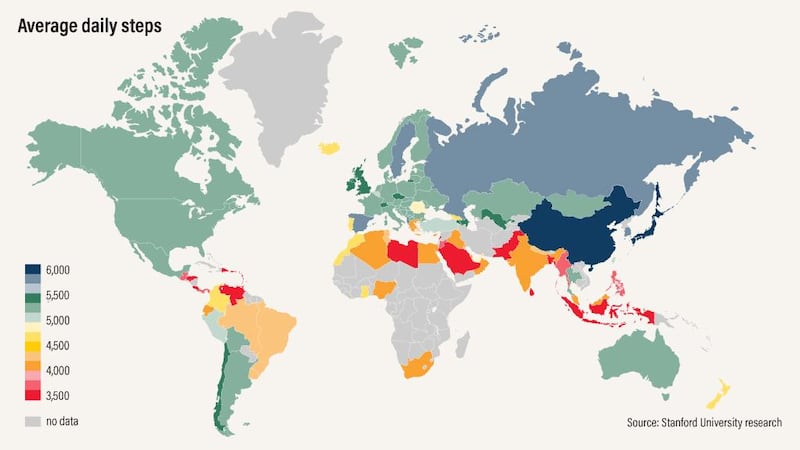Given the heat is at times unbearable, we would have the excuse we need to be a nation that shuns walking.
But the UAE arguably fared better than expected in a global exercise study - though there is clearly room for improvement.
Stanford University's researchers tracked the physical activity of more than 100 countries by measuring the number of daily steps users take, as recorded by their smart phones.
They found the average was about 5,000 steps daily. The UAE ranked under that with 4,516 steps a day, though broadly in line with North America, Europe and Asia.
With its crowded streets, bustling metro and nearby trails for hiking, Hong Kong topped the chart with an average of 6,880 steps a day. Indonesia was at the bottom of the ranking with 3,513 steps.
“More and more people have access to cars and taxis, meaning that they don’t walk as much as they should," said Rahma Ali, clinical dietitian at Burjeel Hospital. Hot weather and unhealthy eating habits are the two main factors leading to obesity. The heat outside is often an excuse, though should not be, she said.
“I advise my clients to walk for at least 30 minutes a day, however, many are not happy with this as the humidity and heat remains the main factor that stops them.
"That’s why we are now witnessing such high rates of obesity."
The patients sent to her range from the age of 10 and some parents say they "can’t go outside and play due to hot weather conditions”. She did say that the development of "indoor facilities where children are able to play and run around" would help boost movement.
Elizabeth Watson, a personal trainer from Stay Fit, said there should be no excuse, given many apartment buildings have gyms, and there are other places to walk.
“You can do a really good work out at home. You can walk around the house, jog on the spot, go up and down the stairs - this will get your upper body moving and heart rate faster," she said.
Researchers used data to retrieve age, gender, height and weight status of users who registered with a smartphone application that has built-in sensors that can automatically record the number of steps that users take each day.
But, given the data was based on smart phone data, it appeared to have little data for Africa, where overall car ownership is low, and children walking to school is more common.
Other countries will well-documented obesity problems, such as Saudi Arabia, scored low on the steps survey, though, as announced this week, will offer physical education for girls in public schools for the first time.
Published in the global journal Nature, the study found that countries with a bigger difference between the fittest and the laziest also had higher rates of obesity.
The findings were linked to reports that five million people die every year from causes linked with inactivity. While also portraying how countries, gender and communities view physical activity- which in turn has highlighted vital insight for improving people’s health.
The researchers, led by computer scientist Jure Leskovec and bioengineer Scott Delp, also charted a new public health risk they call "activity inequality".
The statistics was used to calculate activity inequality by comparing countries with similar activity patterns and those with unequal activity, certain patterns and health dynamics.
Results found that the bigger the activity inequality the higher the rates of obesity.
Individuals that live in countries with the greatest activity inequality are nearly 200 per cent more likely to be obese than individuals from countries with the lowest activity inequality.
Leskovec and Delp hope their work will help improve public health campaigns against obesity and support policies to make cities more “walkable.”






